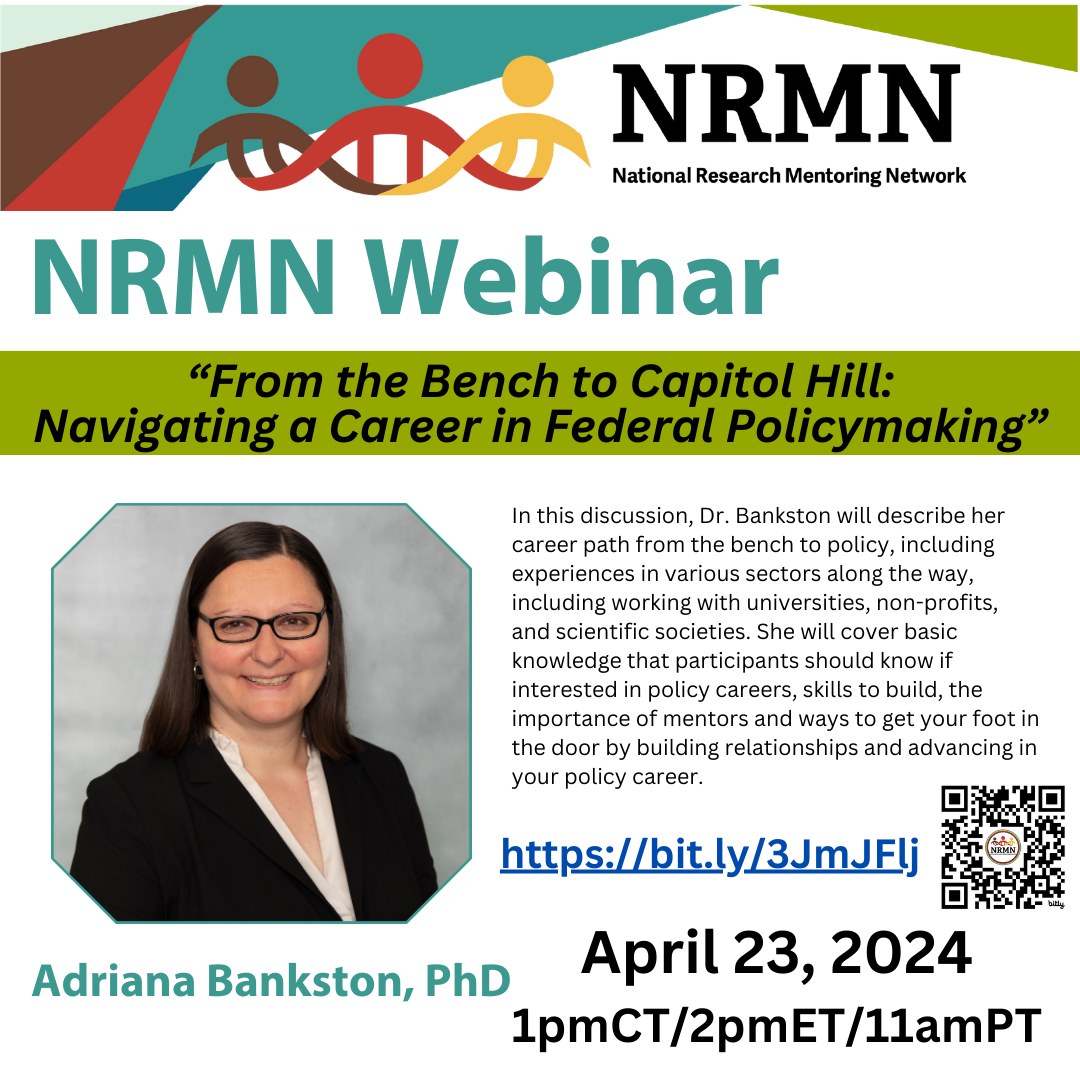
Summary
Dr. Adriana Bankston's webinar, “From the Bench to Capitol Hill: Navigating a Career in Federal Policymaking,” highlights her transition from scientific research to policy advocacy, emphasizing the critical role of mentorship and the importance of integrating scientific evidence into policymaking.
Dr. Adriana Bankston’s webinar taken by the NRMN social team, recently delivered an insightful webinar titled “From the Bench to Capitol Hill: Navigating a Career in Federal Policymaking.” During this session, Dr. Bankston shared her journey from scientific research to a career in federal policymaking, emphasizing the critical role mentors played in her development.
Dr. Bankston highlighted that science policy at the national level encompasses federal rules, regulations, methods, practices, and guidelines under which scientific research is conducted. She explained two key aspects of science policy: “science for policy,” where scientific findings inform public policy development, and “policy for science,” which focuses on governing scientific practices, funding, and support. Depending on one’s role in policy, individuals may work in science, policy, or a blend of both. Policymaking is deeply rooted in evidence-based support, with government decisions often relying on input from researchers who can translate complex scientific concepts into actionable policies.
Before World War II, science and policy were closely connected, driven by the pursuit of the common good. Today, science policy involves providing knowledge-based evidence to decision-makers and building capacity for future policy leaders. This support is crucial for legislators and policymakers who rely on research evidence to make informed decisions. Dr. Bankston shared her academic background, including a Bachelor’s from Clemson, a PhD from Emory, and a postdoctoral position at the University of Louisville. Her interest in supporting the research pipeline led her to career development initiatives and involvement in various scientific organizations. Notably, she developed a career seminar series called “Crash” and engaged with groups like the National Association of Graduate Career Consortium and the Kentucky Academy of Sciences.
Her work with the nonprofit Future of Research focused on university policy and highlighted issues such as postdoc salaries. She also organized symposia to promote early career researchers in leadership roles and advocated for increasing the voices of young scientists in policy discussions. Her transition into policy was furthered by involvement with the Journal of Science Policy and Governance, where she honed her policy writing skills. Participation in organizations like the American Society for Cell Biology, the Society for Neuroscience, and the Federation of American Scientists expanded her network and policy experience.
One of her significant achievements was organizing Capitol Hill Day for the Society for Neuroscience, where she managed numerous meetings and worked on congressional testimonies supporting research funding. Dr. Bankston emphasized the importance of gaining experience, volunteering, and showcasing commitment to policy work. Her journey demonstrates the impactful intersection of science and policy, showcasing how scientific expertise can inform and shape national policies. Her work continues to support the research community and advocates for the integration of scientific evidence into policymaking.
Dr. Bankston’s career path, from conducting lab work in muscular dystrophy to engaging in high-level policy advocacy, underscores the diverse opportunities available to scientists beyond academia. By leveraging her scientific background, she has made substantial contributions to the field of science policy, particularly in supporting early career researchers and advocating for robust research funding. In her closing remarks, she encouraged aspiring policy professionals to seek opportunities to volunteer, engage in research projects, and actively participate in policy discussions. She emphasized the value of networking, continuous learning, and remaining passionate about one’s field to make a meaningful impact in science policy.
In overall, her webinar provides valuable insights into the dynamic world of science policy and offered practical advice for those looking to transition from scientific research to a career in policymaking. Her dedication to bridging the gap between science and policy serves as an inspiration for future generations of scientists and policymakers.